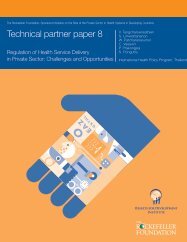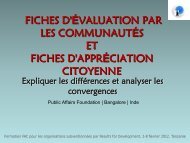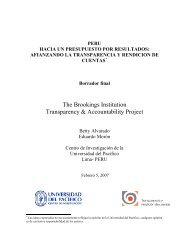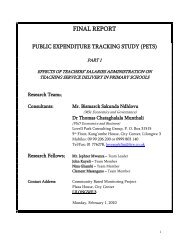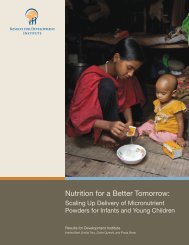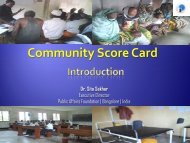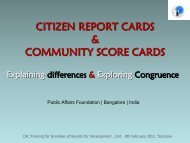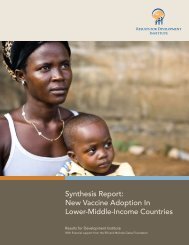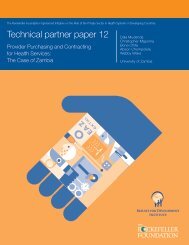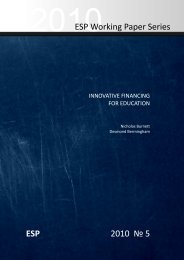Innovative Secondary Education For Skills Enhancement
Innovative Secondary Education For Skills Enhancement
Innovative Secondary Education For Skills Enhancement
Create successful ePaper yourself
Turn your PDF publications into a flip-book with our unique Google optimized e-Paper software.
Figure 4: Employers surveyed in India, by sector<br />
Number of employers interviewed<br />
35<br />
30<br />
25<br />
20<br />
15<br />
10<br />
5<br />
0<br />
<strong>Education</strong>/Training/<br />
Recruitment<br />
IT<br />
Media<br />
Finance<br />
Pharmaceuticals<br />
and Health<br />
Infrastructure<br />
Government<br />
Printing/Publishing<br />
Hotels/Hospitality<br />
Chemicals<br />
Automobile<br />
Electronics<br />
Textile/Leather/<br />
Spinning<br />
Retail<br />
Construction<br />
South Asia 6<br />
Focus groups with 87 employers were conducted in five<br />
cities: New Delhi, Mumbai, and Bhopal in India, Lahore in<br />
Pakistan, and Dhaka in Bangladesh. In total, 49 employers<br />
were interviewed in India, while 19 were interviewed in<br />
the remaining two cities. The participants represented the<br />
high-growth sectors in the region, and many were directly<br />
involved in recruiting and training youth (Figure 4). The<br />
focus groups focused on four areas: perception of skills,<br />
requirement of general skills, possibility of acquiring skills<br />
at school, and sector-specific skills gaps.<br />
The key skill gaps identified are listed in Table 2. At first<br />
glance, they appear to be very different, and also to reflect<br />
the different economic character of each city, its population,<br />
and its surrounding region. Delhi has a better-educated<br />
population than the other cities and a people with<br />
strong interpersonal skills—hence its requirements are a<br />
mix of the advanced cognitive (critical thinking, analytical)<br />
and certain non-cognitive skills. Mumbai and Bhopal have<br />
Figure 5: <strong>Skills</strong> prioritized by employers in South Asia<br />
Values<br />
14%<br />
“Specific” or<br />
technical<br />
23%<br />
Noncognitive<br />
56%<br />
Cognitive<br />
7%<br />
6 This section draws on Srivastava and Khare (2012).<br />
14 <strong>Innovative</strong> <strong>Secondary</strong> <strong>Education</strong> <strong>For</strong> <strong>Skills</strong> <strong>Enhancement</strong> (ISESE)





